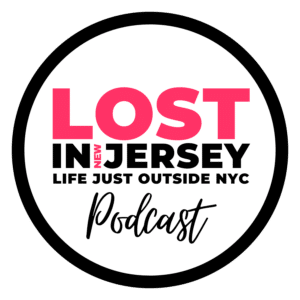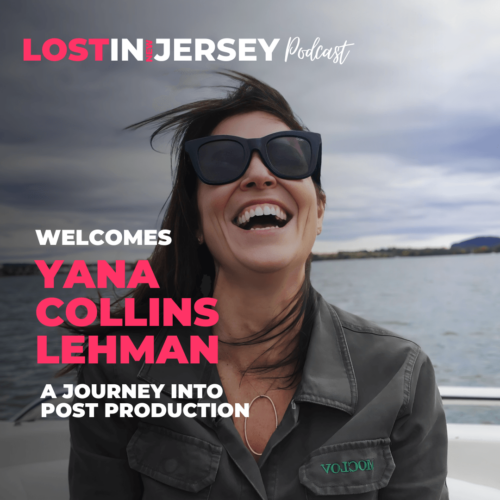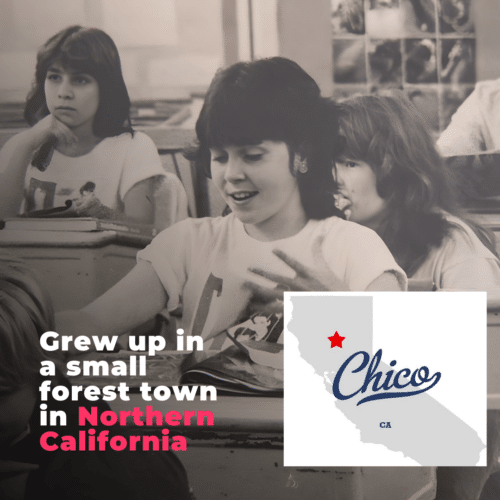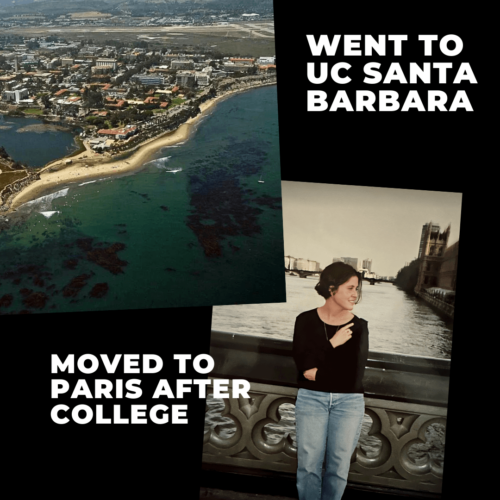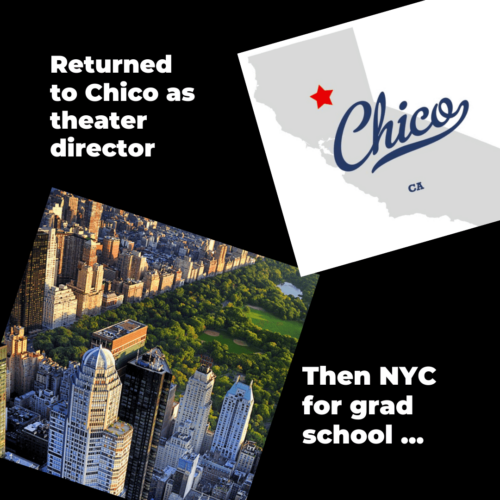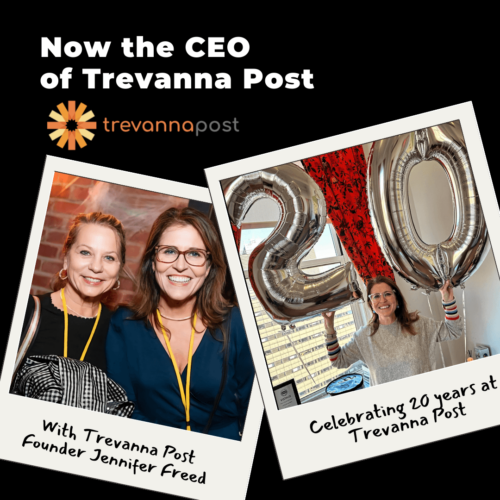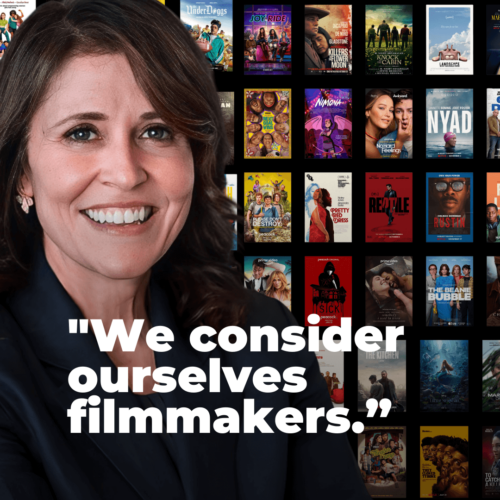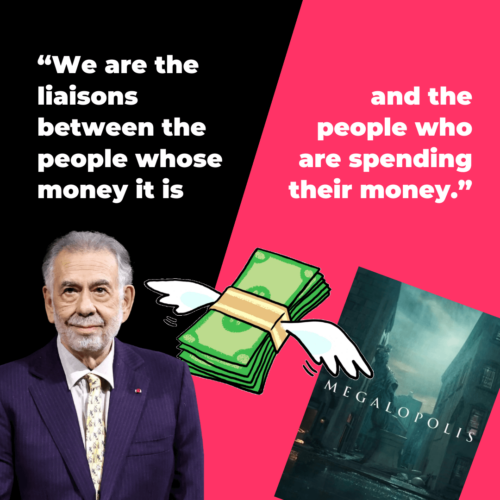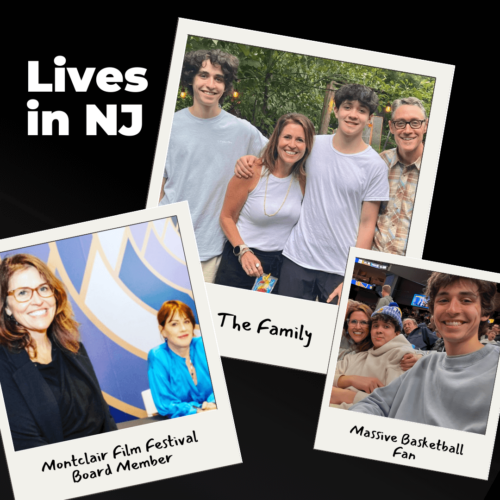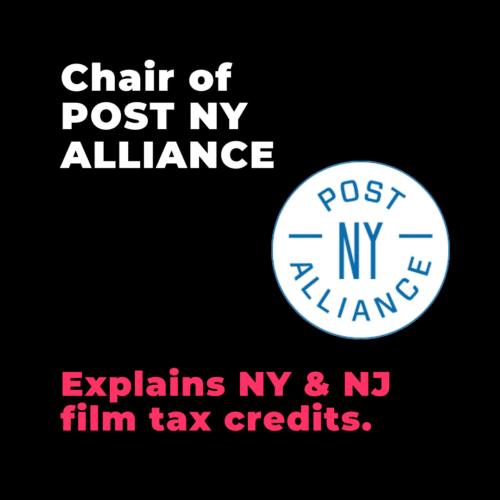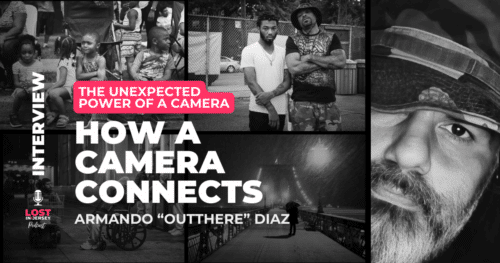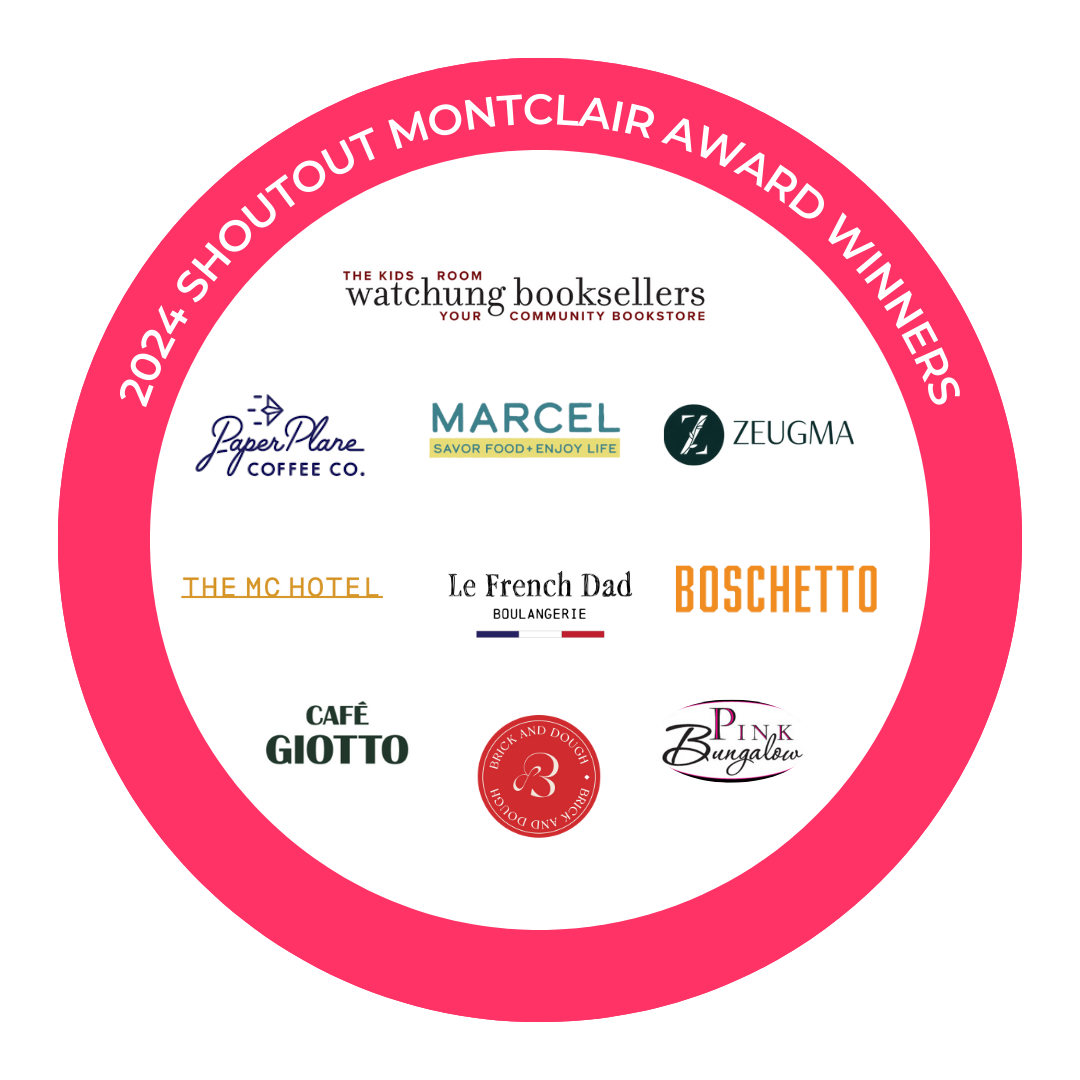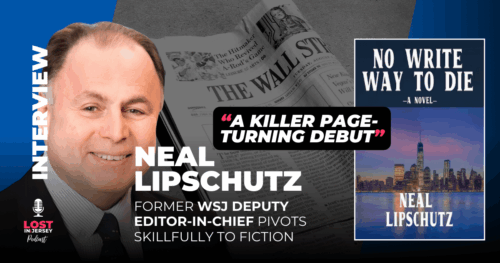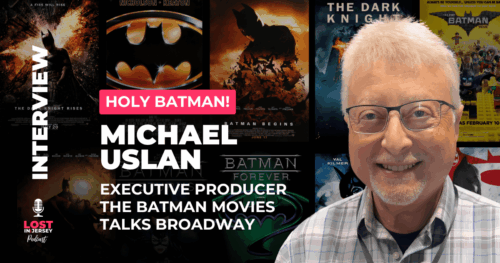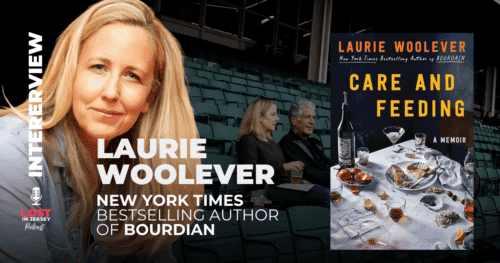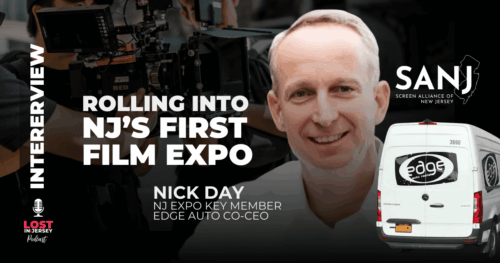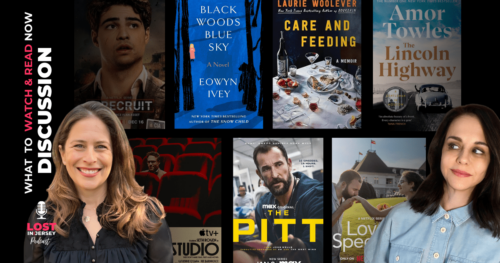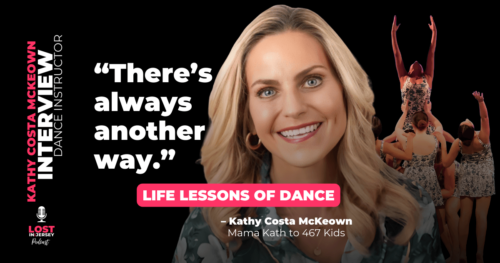FROM A SMALL TOWN TO A FILM INDUSTRY LEADER
Join us as Yana Collins Lehman, CEO of Trevanna Post, shares her journey from a small rural town in the forest of northern California to becoming a post-production expert and industry leader. Discover her insights into the world of film post-production and the flow of money, all while balancing her roles as Chair of the NY Post Alliance, Board Member of the Montclair Film Festival, and a triathlete!
Episode Chapeters
🏠 Growing up in the forest!
🎬 Inside the world of post-production
💸 The power of NY/NJ tax credits
📽️ Montclair Film Festival insights
🏊♀️ Escape from Alcatraz – triathlon adventures
Shout Outs
Café Giotto
Mercado
Fleet Feet
Links:
- Trevanna Post
- NY Post Alliance
- North To Shore at Montclair Film
- Post-Production Aftermath… Great Article
————
🎙️SUBSCRIBE http://tinyurl.com/lostinjersey-subcribe
Yana Collins Lehman
Yana Collins Lehman is a notable figure in the post-production sector of the film and television industry. She serves as the CEO of Trevanna Post, a leading post-production accounting firm based in New York, Los Angeles, and London. Trevanna Post provides comprehensive accounting services for feature films and television shows, ensuring that productions are financially managed from pre-production through post-production.
Yana Collins Lehman has been recognized for her expertise and leadership in the industry. Under her leadership, Trevanna Post has worked on numerous high-profile projects, ensuring financial efficiency and compliance. Her work involves detailed budget management, cost reporting, and financial oversight, which are critical for the successful completion of film and television projects.
Additionally, Yana Collins Lehman is known for her contributions to improving the transparency and efficiency of post-production accounting. She has been an advocate for adopting new technologies and practices that streamline the accounting processes, thereby enhancing the overall workflow in film and television production.
Lehman’s role extends beyond just managing finances; she plays a crucial part in the strategic planning and execution of production budgets, helping to guide projects from inception to completion with financial accuracy and accountability. Her work ensures that producers and studios can focus on the creative aspects of filmmaking while being confident in their financial management.
Episode Summary
Introduction
-
Yana Collins Lehman is a post-production CEO at Trevanna Post in New York City and a board member of the Montclair Film Festival in Montclair, NJ.
-
Conversation with Yana about her background, career, and interests.
Yana’s Journey to New Jersey
-
Originally from Park Slope, Brooklyn, Yana moved to Montclair, New Jersey, with her family due to the stress of finding a home and good schools in Brooklyn.
-
Yana’s connection to Montclair was through a friend who helped her find a house in the area.
-
She grew up in a remote part of Northern California and later moved to Paris before eventually settling in New Jersey.
Yana’s Career in Post-Production
-
Yana’s career in post-production started with an internship at Independent Pictures, where she transitioned to working as an assistant to the CFO.
-
She later worked with a producer and lawyer, John Sloss, before transitioning to post-production supervising.
-
Yana eventually joined Trevanna Post, a post-production accounting company, where she now serves as the CEO.
Insights into Post-Production Accounting
-
Yana explains the role of post-production accountants in managing budgets, financial reporting, and ensuring smooth project delivery.
-
She highlights the importance of tax credits in the film industry and how they impact production decisions and financing.
Involvement with Montclair Film Festival
-
Yana is a board member of the Montclair Film Festival and chairs the education committee.
-
The festival hosts year-round educational programs and events, with upcoming film screenings and discussions planned for the North to Shore Festival and the main festival in October.
Yana’s Triathlon Journey
-
Yana is an amateur triathlete who has participated in events like the Ironman and the Escape from Alcatraz swim.
-
She shares her experience with training and competing in triathlons, highlighting the challenges and rewards of the sport.
Favorite Spots in New Jersey
-
Yana mentions Cafe Giotto, Mercado, and Fleet Feet as favorite spots in New Jersey.
-
She appreciates the beauty of the Jersey shore, lakes, and the vibrant spring season in the area.
The podcast is produced by Rachel Martens and Janette Afsharian.
Episode Transcript
Transcript – Yana Collins Lehman Interview
SPEAKER_00:
Hi, Rachel. Hey, Janette. Today, we have an interview with Yana Collins Lehman. She’s a good friend of mine, and we just had a really good conversation with her. And she talks to us about her work as a post-production CEO at Trevanna Post in the city. And she also talks about her being on the board of the Montclair Film Festival and also a little bit about being a triathlete. So it’s a very fun interview and we learned a lot.
SPEAKER_01: Yes, and I love hearing a little bit about her background in California before she made it all the way to New York and then to Jersey. So please enjoy this episode. We definitely did.
SPEAKER_00: Welcome, Yana. Thank you for being on the podcast. Thank you for having me. I want to introduce everybody to Yana. She is a good friend of mine and we’ve been friends for I don’t know how many years now. It’s like eight years or something like that. Right. My son invited your son to a birthday party at some soccer facility. And I remember you walking out and you had this huge smile on your face and you’re like, hey, and I was like, I like this person. Right away, right away. And then we’ve been friends ever since. So it’s been a pleasure to know you and to have you as a friend and also to have you here to talk about your connection to New Jersey, but also your career. You have a company that’s in the city, so you commute. So that’s kind of an interesting, you know, part of the story is that you are a big commuter from New Jersey to New York. You are Trevanna Post CEO, post-production company in the city. And, uh, we want to get into all of that, but first tell us how you got to New Jersey.
SPEAKER_02: Okay. Like everybody else, I’m from Park Slope, Brooklyn. Like everybody else, my kids were six and two, and we had an apartment in Park Slope. We were looking to buy in Brooklyn. It was so stressful. It was so expensive. The schools were not good. And. The owner and founder of Trevanna Post, the company that I am in now, lived in Montclair. She saw my face and how I was so stressed out. I mean, I felt like every morning I was waking up with an anvil on my chest. The stress was unbelievable and trying to find where we were going to live and a school. I didn’t know when I had kids that I was going to stress out about school so hard. And. So she said, will you please come out to Montclair and just look at what’s out there and please meet our broker, Aaron Crawford, who’s my good friend to this day. So we started taking the bus out to Montclair and looking at houses. And I really. It is not my thing to look at houses. My husband loves it. He’s someone who goes on home tours. I find it stressful and I know I’m going to get it. I don’t really want to see it. Also little Francis. got quite carsick. So that whole experience was not great. And then we would rented zip cars as it started to get more serious rented zip cars and the fights we got into because the signage, as I’m sure you are aware, and it’s been covered, the signage in Jersey is no bueno. Yeah, get in these who’s afraid of Virginia wolf level fights. getting lost on the way to the fair.
SPEAKER_00: Oh my God, Yana, I swear to God, that is exactly the scene. The first massive fight was in the car getting lost in this in New Jersey. Yeah, it was bad. Anyway.
SPEAKER_02: So long story short, the wonderful, incredible Jennifer Fried, owner and founder of Trevanna Post and dear friend She loves looking at real estate. I mean, loves it. She found our house. No way. I found it. I’m out. It has amazing curb appeal.
SPEAKER_01: I can’t believe you were able to just trust like someone else to pick your house, but that’s awesome. But where did you grow up?
SPEAKER_02: Oh, I’m from California. I grew up, um, in a savage little part of Northern California called Chico and even more savage in a forest called forest ranch. The population is 1500. It was 1500 then, and it is 1500 today. Wow. My mom married this dude who brought us to the forest and they built this house and it was really, really isolated, very remote. So, um, I had a one-room schoolhouse where I went to school from the time I was in third to sixth grade. And I had the same teacher who was also the principal.
SPEAKER_01: Yannick, that is incredible. Do you have photos from that? We need to see that. Sure. Yeah. Wait. So do you have siblings or was it just you?
SPEAKER_02: I have have siblings. Okay. So it’s just me. You know, I was born in San Francisco, moved to LA. My dad was trying to be an actor. My parents got divorced. We moved back to Chico where my mom is from, like really from there. People go to Chico state. It’s a college and then they say they’re from Chico, but my mom is really from Chico. Her dad like built all the college housing. And so it was really from there. And so, um, and then she married this guy and then we moved to the forest and then I just dreamed of getting out. I just dreamed of getting out of the forest. Then I went to high school in Monterey to all girls Catholic boarding school called Santa Catalina. And then I went to college in Santa Barbara at UC Santa Barbara. And that was, then I went to move to Paris with my dad, and then my dad stayed in Paris, and he married a French lady, and they had a French love child, my half brother Max, and my mom had two children, Brian and Kayla. So my siblings are Brian, Kayla, and Max.
SPEAKER_01: Wow. That is so fascinating. I love it. I can’t even imagine having grown up in suburbs of Long Island to grow up in such a small, isolated, rural or foresty town. Yeah.
SPEAKER_02: So beyond, so Chico’s the city and you drive 45 minutes up a highway and then another four miles down a one lane dirt road to where our house was.
SPEAKER_00: Wow.
SPEAKER_02: So isolated. And I would just sit there and fantasize about when I was going to move to New York.
SPEAKER_01: That’s incredible.
SPEAKER_00: That’s so something you moved to Paris before you came to New York. So you were, is that where you came after you came to New York from Paris or how did that, how did you end up in Paris for a year?
SPEAKER_02: And then I moved back to Chico where by then my friends had started a theater called the blue room theater. It was a small avant-garde black box theater. And I became the managing director of that theater. and was the managing director for five years. And we did like original plays and Samuel Beckett plays. And in fact, I directed Samuel Beckett’s Endgame. And that’s when I had a dream that I had a daughter named Beckett. So when I actually many years later had a son, my first child, I knew I was going to name him Beckett. That’s where his name came from. And so, you know, nonprofits, you kind of get pretty burnt out. And also Chico is, as I mentioned, incredibly savage. And I knew I had to get out of there. And so I applied to grad school in New York and that’s when I finally made it to New York for grad school. And at the time I was dating this rock drummer, but we broke up so that I could move to New York and he had a band in Chico. Um, that was a pretty big deal in Chico. Um, but then eight months later he followed me. And now I’m married to him and we have two children. Yeah.
SPEAKER_01: Gosh, is he still a musician? He is. Yeah.
SPEAKER_02: Yeah. Just recorded an album in Chicago a couple of months ago. He’ll be coming out. His new band is called Raised on Candy. I saw that.
SPEAKER_00: I saw his new band name. I love that name.
SPEAKER_02: I love the piece of candy is the logo. It’s so hard to come up with band names. Do you guys know how hard it is?
SPEAKER_01: I do know because I’m in a band and we had a name and then we were trying to, from years ago, But then we got the band back together, which sounds like a really bad movie. It kind of is. It’s the midlife crisis. Get the bit. Let’s get the band back together. Where is everyone? And then we got back together and we’ve been throwing out band names for over a year. And they start out so raunchy and ridiculous and then they get more absurd and Dadaist. And then we try to pull it in and rein it in. They’re all over the place. Yeah.
SPEAKER_02: Anything you think of you type it into band camp. Somebody already has a band that name.
SPEAKER_00: Yeah. Yeah. It’s like domain. It’s like finding a domain. Yeah. Yeah. So now you’re in New York city and you’re going to graduate school. Let’s figure out how you ended up into post-production work. Okay.
SPEAKER_02: I’ll take, I’ll do the fast version. So the teacher’s college getting a degree in arts administration. Basically I got into. basically to learn to do what I was doing sort of on an amateur level professionally. But as part of this program, you have to take classes at the law school, the film school, and the business school. Oh, that’s smart. Yeah, it was a great program. And you have to go get an internship. So I watched this movie Gummo by Harmony Crinn. And I just was like, Someone made this movie that how, what somebody is out there making movies like this. This makes no sense to me. And I waited for the credits to roll and I saw independent pictures and I cold called independent pictures and said, I have to come and work there. And it was Carrie woods. And, um, I was, so I got an internship there. It was so much fun. And I learned so much, but what I learned was that the production side of things just took so long. And it was so theoretical, all these producers on the phone being like, I want to make this and I have this idea. And it was cool, you know, like Harmony and Chloe Sevigny were coming in and, you know, it was a cool time. You know, the end of the nineties was such an easy time to be in film. But it was just like too much talk, not enough action. And meanwhile, on this side of my face, I could hear Andrew Carpin the CFO talking about the finances. And that was real. And none of this over here, none of the creative stuff could happen without what Andrew Carpenter was doing. So I went jumping over to there by then Andrew Carpenter left and Kathy Choi had taken over and I became her assistant. So I was actually employed. I was no longer interning and I was assistant to the CFO of independent pictures. However, this was also the time where Chase was giving big, huge lines of credit to. production companies and they were spending all that money on Eames chairs and non-important things. And then going belly up, you know, mostly movies don’t make a ton of money. Mostly movies are. At a loss and because they’re so expensive because they’re so expensive and you really are just riding on really thin margins. Every film company at that time. had a folder called the Blair Witch Project in their file because they were all trying to figure out how to do that, how to make that happen, how to make a movie for no money, and how to make that much money. And it’s just really hard.
SPEAKER_01: It’s just really hard to do. It’s like a diamond. It’s like a needle in a haystack is what I wanted to say.
SPEAKER_02: Exactly. And that’s why Miramax started Dimension because Dimension was the horror part. And they realized horror movies don’t cost very much money, and they make so much money. Every film company kind of has a little horror division. Anyway, another sidebar. So, so I had to pack up Independent Pictures once it went belly up and handed it over to New Line. And then I got a job with John Sloss, who is a big producer, lawyer, and I became his paralegal. And after five years there, I thought I maybe was interested in doing post-production supervising. And I made a really good friend named Jennifer Lane, who I’m actually having lunch with today, who was a post production supervisor. And she said, you should meet Jennifer Freed because she has this company, Trevanna Post, but she’s just. Starting to kind of get into post supervising and I met Jennifer Freed and it was sort of, I mean, I remember it as love at first sight. Also, what really happened is that her current, um, coordinator had just checked her email that day. Like she went in and checked Jennifer’s email. And so Jennifer was firing her and she met me that day. So it was all kismet. Oh my gosh. So she was the post production supervisor of Vanity Fair by Mira Nair and with Reese Witherspoon. Yes. I love that director. I love Mira. We worked in Mira’s office and by some crazy circumstance, Jennifer had to go do additional photography in India. And she sent me to coordinate the ADR in London. Do you know what ADR is?
SPEAKER_01: Well, I do, but Janette doesn’t. I don’t.
SPEAKER_02: So ADR is, um, additional dialogue recording because you don’t get a line, right? Like you guys might have to bring me in to redo some of my dialogue in this interview. So it’s really cool. You sit there with the screen playing the movie and then the actor comes in And the director’s like, can you just say it a little more like this or a little more like this, but they kind of have to lip sync their line. And so I had to coordinate all these actors in London to come in to Delane Lee and record their lines. And it was really fun. I loved it. And I loved London, but Beckett was like, not even. Not even a year old at the time. I left him and went to London for 10 days. I know for 10 days.
SPEAKER_01: Oh, that’s okay. I’m like 10 years. No.
SPEAKER_02: Yeah. And so Jennifer and I just got along so well that when vanity fair was over, we didn’t really want to leave each other. And she sold me on coming to Trevanna post. She’s like, I know you’re probably going to wind up being a producer, but this way you’ll have learned. post, you’ll have, you’ll have the legal behind you and you’ll learn accounting. So Travonna post, um, is a post production accounting company. And what post production accounting is. Post accountants take over from the production accountants, production accountants are on during production. And that job is you can really only work on one project at a time. And maybe you have 16 people in your accounting crew and You have thousands of crew that you have to deal with, right? All the actors, all the unions, all the creeds. It’s a huge job. It’s incredibly stressful. You’re on set while they’re shooting. It’s a completely different job than overtime and all that overtime, meal penalties, all that stuff, multiple unions. So then they hand it over to the post-production accountant when they leave. Um, and we handle it during. picture editorial, sound editorial, music editorial, visual effects, finishing. The first part of that director’s cut. So it’s a way more calm situation because who do you have? You have the director sitting with his editor and their assistant, maybe a PA who’s grabbing them lunch. The post schedule is fairly predictable. And that is why we can work on multiple projects at the same time.
SPEAKER_00: So post-production is basically after the filming and all the actors go home and the daily shoots are there. You come in and you help the people that are doing all that work to get that into film shape.
SPEAKER_02: What I like to say is that we are the liaisons between the people whose money it is and the people who are spending their money. And we keep all parties chilled out by our reporting. So I’m a signer on multiple bank accounts. I was just going to tell a sidebar story about Megalopolis.
SPEAKER_00: Tell it. Oh, please.
SPEAKER_02: I mean, I think it’s public territory. Mr. Coppola self-financed that. Yeah. So your signers on Francis Ford Coppola vineyards. Thank you. Wow. Those signature cards coming through were really wild.
SPEAKER_00: It was that, that movie. How, how much, I mean, the, the budget on that is where $250 million. 250 million and she’ll finance. Yeah. Pretty incredible. And so, okay, let’s say, let’s take that one for an example of what you’re signing on. You’re helping, uh, coordinate. Cause I know that I read this article that you were after math article that was out that you sent us to, and I’ll, I’ll put, we’ll post it as well. It’s so good. Yeah. And, um, you were saying that you sometimes are consulting. You don’t just handle the books. You’re also know who does what and who’s good at what and what needs to be do what, who needs to do what.
SPEAKER_02: Right. So when I started 20 years ago, gulp, one of the first shows I did was inside man, the Spike Lee movie. And that was overseen by universal. My go-to person was this guy, Rick Morelli, who’s my friend to this day. He’s now at Sony. And he was a numbers guy, finance guy. He kind of taught me, you know, how to do my job. And our job was really reporting to major studios. There has been a shift in how studios are, right? It used to be, who did you have? Disney, Sony, Fox. And then something happened where billionaires gave their children a billion dollars to go start a movie studio. And so. Those creative geniuses hired their friends and they made movies, right? So there became a moment where our jobs were really less of just crunching numbers for people who could have done our jobs easily. Yeah. And having to really advise people about what they were going to do with their budgets in the post-production process, because they didn’t come at it with decades of experience. So for example, something really common in a post-production budget, really common. Well, first of all, production is always stealing from posts during production, right? They run out of money and they’re like, Oh, we don’t need all this money for visual effects. Who needs all this money for music? What are you going to do a big score like that for? And so they’re gutting the post budget. So we get the budget and we say, Oh yeah, no, $25,000 for visual effects. That’s not going to cut it. Not even close. Um, and Oh, really? You think you’re going to pull this off with $50,000 of music licensing? That’s also not going to work. And a final sound mix costs about 10 times what you have in here. So that’s sort of like our initiation into this is when we first take over a movie, it’s a look sometimes can be a little contentious. Yeah. We have to give that kind of advice or something like, um, Well, we’ll just take that from titles. Well, what’s your plan for titles? You eventually are going to need titles. And depending on the movie, you might want titles that are super cool, you know? And that costs some dough. So it became a little more like that. Plus, what used to happen when you were financing your film is you would go, so you would have, say, you were going to make a $5 million movie, and you would have $3 million in it. But you would need the other $2 million. And so you would have to go find some gap financing. And you would take your script, and you would say, I’ve attached all these actors. Can I, you let me the other 2 million and there was these companies that loaned there. It’s called mezzanine financing. Okay. And so they were just loan you the last patch of your dough. Now the new mezzanine financing, those companies don’t exist anymore. It’s real. Oh, maybe they do, but is, um, tax credits. Yeah. I was hoping you talk about that as a tax credit. I mean, I can get so into it, but I’m sure the listener will be like, nobody wants to talk about tax credits.
SPEAKER_00: Well, I want to know, I think it’s important because it’s such a, it has such an impact on where New York area and New Jersey now, because New Jersey governor Murphy has been really, really trying to make this a state of film production. And so just touch on that too, about. Do people come to you before the movie even starts to know where they should produce, create for locations because of the tax credits?
SPEAKER_02: Yes and no. I am a massive, you know, I’m also, um, chair of the board called the post New York alliance. And we lobbied for the New York post incentive starting back in 2009. So it’s pretty well known that if you come and talk to me, I’m going to convince you to make your movie in New York. I’m not impartial there, I just can’t be. Yeah, I understand. But as I live in New Jersey, and I’m also on the board of the Montclair Film Festival, and I’m very partial to New Jersey, I’m invested in New Jersey’s tax credit also doing well. And the existence of the New Jersey and the New York tax credits have been great because one governor will raise it to $700 million a year, and then the other governor will raise it to $700 million a year. And that’s great for everybody. Canada’s is so aggressive that we’re just trying to like keep pace with Canada because they just give you so much money back. But basically the idea is that it’s shooting your film or I would argue finishing your film in a location is such an economic stimulus to that location. You wind up spending a lot of money there on things that aren’t even pertinent to your film. You’re going to restaurants there, you’re going to the dry cleaners there, you’re spending money in hotels. And so the argument for a film tax credit is that you want a film scene, film or television, you want this, you want entertainment to be part of your state’s industry. Why is that? Well, people coming out of college want to be in a state that has a vibrant entertainment industry and they just do. That’s why you want to have a tax credit. How tax credits work just in brief is that you have your entire budget. Some of those costs are considered qualified spend, and depending on the state that you’re in, you will receive back after you complete your project, a rebate from the state. So for example, in New York, it’s an actual cash rebate. So if you have a million dollars of qualified spend, you will receive $300,000 back in the form of a check, if you submit your tax return, and you have a zero tax liability in New York State, which you will, because you set up a single purpose entity, you will get this cash monies. So that is to go back to my other point, how people can get the mezzanine financing for their film, they can say this is the tax credit projected to get, and you can have it. Okay, so they finance their tax credits, and someone will loan them money based on Getting that back.
SPEAKER_01: Because they need the money up front in order to finish filming or producing. Exactly.
SPEAKER_02: In New Jersey, you have to sell your credit. So that same $300,000 you’re anticipating to get in a credit, you got to go to Walmart or Samsung or Audible and say, you want to buy my credit? Because those are massive corporations that have a huge tax liability in the state and they’re looking for all the credits they can get. So if they can have a $300,000 tax credit that they can file with their corporate tax returns, but they got it for 200,000. Right.
SPEAKER_01: Cause they’re not going to sell it.
SPEAKER_00: That’s so interesting. So that happens. So like, let’s just say, you know, you know, Sony or whatever it is, buys a tax credit from a film that’s being produced in their state. Then they, for 200,000, you’re saying, and then they can use it for 300,000.
SPEAKER_02: as a $300,000 credit tax credit itself issued in a certificate by the state. Because you spent a million dollars of qualified spend, it’s a 30,000, it’s a 30% credit, we’re going to give you 30% back on what you spent that’s qualified, there’s a number of costs that aren’t qualified, but the qualified spend, and so you have your tax credit certificate for $300,000. In New Jersey, you have to sell that New Jersey isn’t going to write you a check. In other words, Governor Murphy, as generous as he is, has not actually allocated $700 million of New Jersey’s cash to this credit. They’ve allocated $700 million in tax credits that can then be transferred to corporations with a tax liability. And why you would Like say lost in Jersey, when you guys become like multi-billionaire corporation, you’re going to be hooked. You’re going to have, you’re going to owe a lot of money in taxes, right? You’re going to have a million dollar tax liability. You’re just going to have to pay a million dollars. But if you can discount that, because you, here’s a tax credit for 300,000 and you’re going to get it. And you only had to pay 200,000 for it. You. You give the seller a haircut, unfortunately, but that’s what financing is. Everything has a VIG. The seller is going to take it at a discount because they need that cash up front to make their movie. Then you’ve saved $100,000.
SPEAKER_00: I think I get it. Trevanna Post knows all of this. We know everything.
SPEAKER_02: You guys know everything. And Trevanna Post is just a great company. We’ve been around for 20 years. And I think the reason why we’ve done so well and why we’ve been hired again and again by all of our clients and pals is because we’re obsessed with movies and TV. We take it so seriously. Whereas I think some accountants have the reputation of being like cranky bean counters. We consider ourselves filmmakers. We get really into it. We take every project really seriously. Um, that’s who I hire here. You know, I hire people who are obsessed.
SPEAKER_00: So if somebody is making a movie, uh, they, they need to have, they don’t have to have a post-production team, but they are going to need, they’re going to be knee deep and like. trying to figure out how their, the licenses work for everything in the film and how to, you know, how to deal with the tax credits, how to get the right people to do the special effects, how to pay everybody and how to come on budget. I mean, that’s a ton of work for a film.
SPEAKER_02: It seems like it’s, it’s, you have to have it, but I don’t think you have to absolutely have to have some sort of post account. I mean, you can do it yourself. You can try to do it all in Excel. You can try to handwrite some checks, but it’s going to be pretty tough when you want to deliver your movie to the distributor in Prague and you don’t have a clean paper trail. They’re going to be like, do you own this? Do you have the rights to this? Did you pay for everything? So we’ve also recently, not so recently, five or plus years ago, um, started a software company called Trevanna tracks, which tracks all music license payments, because that’s a massive pain point that can really hold up delivery. And, you know, back in the day, we were like, again, with this situation of you have multiple, you’re delivering to multiple parties. You see these films and television all over the place. Um, And it’s all separate deals, the rights to distribute and the rights to show the project in Canada versus Mexico versus North America versus Europe versus. Right. You like read about and can, how these deals are being made for the different rights everywhere. And that is a separate delivery to all these different parties. And then when you have, you know, music licenses that you can’t prove. You have the right to the song and music licenses are complicated. There’s the sync license, which is a different. company from the master license. And yeah, it’s a track of so many deals, so much proof of payment. And Turvana Tracks is a very clean software where everything is contained in one easy kind of portal. So you can easily prove proof of payment. You can see all the music licenses you’ve ever used or licensed. So it’s a beautiful software. And that’s what Jennifer Fried is now working on exclusively. And I’m taking it for a Toronto Post.
SPEAKER_00: OK. Well, you mentioned, before we get into it, I want to talk about Montclair Film Festival, because you mentioned it. So I want to know, I remember a couple of years ago when you were telling me that you wanted to become part of the Montclair Film Festival. And you are now part of the board. And what’s great is it’s part of what you love. It’s about film. And you love film. And now you’re part of it. Talk a little bit about your involvement with the Montclair Film Festival and what is coming up for this next year. We talked to Tom Hall last year, but I know things are starting to cook up for the new film festival. What’s happening?
SPEAKER_02: Yes, I worked very hard to get on the board of Montclair Film Festival because I can’t believe it’s such a cool festival right in our little town. They get the greatest titles from all the film festivals around the world that you read about all year. And then it’s just 10 minutes from your house at the Claridge. I just couldn’t tell how much I love that. So I’m so happy to be on the board. I’m currently the chair of the education committee. And as you know, Montclair Film is a year-round education organization. They’re teaching classes. They’re taking programs into schools. They work so hard. And the film festival, another part of what we do, so there’s a mini film festival happening at the end of June, the North to Shore, as part of the North to Shore Festival, which Governor Murphy asked Montclair Film to do to raise awareness of the whole shore, to bring art to the whole Jersey Shore. And Tom Hall, who I don’t know when this person sleeps. He does it because I remember he like watches for days, hours, 48 hours, blown himself to be able to pull all this off, but he. Programmed a mini festival. It’s a week long, legitimate festival of these first run documentaries that are showing. And then Stephen Colbert is having a conversation with Paul Giamatti at NJPAC. That will be very exciting. And then our festival, October 17th through the 29th, 28th, that, you know. remains to be seen. I mean, I know some things, but I just can’t tell you what we need some inside.
SPEAKER_00: Oh, it’s secret.
SPEAKER_01: I knew it. Then I have to kill you. I knew it.
SPEAKER_02: Well, that’s cool. I’m gonna tell you this. It’s so cool. Really good festival.
SPEAKER_00: Well, there’s gonna be a big difference in this year’s festival from last year’s festival because the strike hopefully there won’t be a strike going on by the time it rolls around.
SPEAKER_02: This is gonna turn this interview into such a downer. Well, the good news is the actors, the writers, and the directors couldn’t strike if they wanted to. So they are going to be able to promote their movies such as they are. And I’m sure we’ll have some big names at the festival this year. So that’s very exciting. I hope there is no strike, but I am a betting person and I believe that the Teamsters will strike. I sound naive, I guess, to people when I say this, but we knew when these contracts were up. Forever. It’s not like it’s just sprung upon you. It’s not a surprise. You know, when the contracts are up, you know, that we have gone through COVID and this other production shutdown, and we are all hanging by a thread.
SPEAKER_00: Because I know having talked to you that, you know, so many people were out of work for a really, really long time.
SPEAKER_02: People have changed jobs. And a big part of what I do as the head of the Post Alliance is I encourage students and adults who want to change jobs. I encourage them to come to the industry. It’s a real bummer. And it is hitting post-production particularly hard because who’s going to heal first is when everything goes into production. And I have it on good authority that there is a pipeline like, you know, Netflix and major studios. have a pipeline, they’re just waiting to greenlight. So that is good news. Post-production has been out of work for a long time, and it’s going to take another, you know, nine months when production normalizes. Post-production doesn’t get that work until much later, much later, right? Specifically our visual effects industry, which I am so proud of in New York. We’ve really built it up. It’s a wonderful industry. We have wonderful companies here. And it really breaks my heart because their margins are already really tight. They can’t wait it out for this long. And who will be there to airbrush the cellulite off your thighs when there’s no visual.
SPEAKER_01: I was thinking visual effects is like a special effects, not cellulite effects, but I guess it’s the same thing.
SPEAKER_02: Rachel thing is, and this is what I tell all young filmmakers. Your first call should be to a visual effects supervisor because you have a script and you think you’ve got to go to Bermuda and you think you need to have a tennis court and you think you need to have a prison. Oh, so I’m thinking Wolf of Wall Street. The prison scene was shot in a tennis court in Queens that the visual effects can just paint it to make it look like. So you can actually save a ton of money on locations if you call a visual effects supervisor and they’ll tell you how they can do it for you. Especially with flights being so expensive. That’s what I’m saying. And they will not charge you like a lawyer charges you per hour. They’re going to look at the script and give you some great ideas. In exchange, you’re going to use them as your visual effects company. But to go back to how we started when we tell people like $25,000 isn’t going to do it. Because even if you don’t have a Marvel movie, you have a little rom-com Beauty fixes are a big deal. I will not say who the actresses and actors are, but you have to do a tremendous amount of zhuzhing.
SPEAKER_01: You know, that’s so interesting. I been such a fan of the industry and, you know, tried my hand in it when I was a lot younger, uh, as an actor, but I’m still so naive when I think about what it looks like when we finally see the product, you know, about all the. Filters that are on your phone and that my teenagers can use and play with. It’s, it’s still hard for me to wrap my head around. Oh, that would be probably used in a feature length phone.
SPEAKER_02: Well, one way that you can quantify it is when you’re watching the credits of any movie that you watch. And watch all the visual effects companies that they use. All those people who have jobs in visual effects.
SPEAKER_00: I’m going to notice that now. The most egregious one that I have seen recently was Palm Royale. The filtering and visual effects on every woman in that show was so over the top. So I mean, I was just like, do you think that was a style choice? I think it was. Yes. But it also, you know, distorted everyone, you know, it could be a style choice.
SPEAKER_02: It could also be contractual. Often it’s contractual. They write it into their agreements that they get X amount of beauty fixes and final cut, you know, final say on what they look like.
SPEAKER_00: I want to also shine a light on the fact that, and also ask you a little bit about you being a triathlete. So you’re a, you have done the Ironman.
SPEAKER_01: Before you keep talking, Janette, I need to stop and I need to hear what you’re a triathlete.
SPEAKER_02: Well, I’m an amateur age group. Enthusiasts, but I love to race. It’s really fun. And I did train for the Ironman Lake Placid. That was a crazy thing to do. It was in 2020. So I actually had to train for it twice. Oh boy. It got canceled. So I had to train for it for two years in a row. And also, and I also did the New York city marathon that same year. So I guess that was, I remember it was insane. It’s not smart. But, but I’ve changed it all up. And now I do short course, you know, there’s sprints, triathlon sprints, which, you know, take you an hour and a half, but just run and bike and run. And how did you start?
SPEAKER_00: How did that start? Were you, were you an athlete in your one, one room schoolhouse as a little kid, you know, or cross country in high school.
SPEAKER_02: Okay. Pretty good. Kind of singled out and. What happened was to my friends, Heather Dibble and Karen Dirks wanted to do the iron woman at Sandy hook in Jersey. It was just, we got really excited about it. We all trained for it and we did it. And I fell in love with it and they were like, that was fun. Um, I don’t think they wanted to do it again. They’re both very athletic, but then I, what I was okay at swimming and fine at biking, but I always got smoked on the run. So I was trying to get better at running. But running alone in the mornings, which is the only time I can work out because I work was kind of scary. And so then I found a running club and then that really changed the game. Wow. Yeah. It used to be called Fuel by Donuts. It was run by Montclair Bread Company. And then it also became a little bit of a triathlon community. Anyway, so I have good friends who all like to race and. I think it’s just a great fun way to stay in shape.
SPEAKER_00: I remember the most interesting race when you swam to Alcatraz. Escape from Alcatraz.
SPEAKER_02: I can’t wait to do that one again. You jump off a ferry into the San Francisco Bay. It is so cold. And then you swim to St. Francis Yacht Club. And the year I did it, 600 people were swept out. and had to be rescued because of the current. It’s so crazy. And I actually swam twice as long as I needed to, like fighting the current. What an unbelievable race. I mean, I will definitely do it again.
SPEAKER_00: It was so much fun. Is that why the current made Alcatraz a hard escape, do you think? Is that current? So you kind of got to feel the cold.
SPEAKER_02: The current and the cold. Are you wearing a wetsuit? Yes. Yeah. For sure. A wetsuit, two swim caps, earplugs.
SPEAKER_00: Well, Yana, thank you so much for being on the podcast. This is amazing. We did it, you guys. Wait, wait.
SPEAKER_01: Before we let you go, we need to know some of your favorite spots in Jersey. Shout outs from New Jersey.
SPEAKER_02: Cafe Giotto. And especially their incredible family style meals that you can order and bring home. Huge Lehman family favorite. OK. Mercado, ice lattes. Absolutely love that place. Fleet Feet for all your shoes. Yes. Greatest. And I mean, obviously the ocean, the Jersey shore, we’re so close to it. So lucky. All the lakes all around. That’s true too. All the lakes are so beautiful. All the lakes. So beautiful. Great water temps. I just want to shout out the spring this year. I mean, what is going on? Most gorgeous. It’s out of control.
SPEAKER_01: The bloom, the flowers are out of control. It’s amazing the pops of color everywhere.
SPEAKER_02: And it feels like it’s going like we’re really having a spring, like we’re having like this really long spring. So this is really fun. Thank you guys so much.
SPEAKER_01: I’m so glad you came on. Congratulations on all your success. Well, thank you so much, Yana. Same to you. It’s so exciting to learn all about the post-production accounting side and also how you do consulting and really try to get the entire project done, not just frugally or to make sure you don’t run out of money, but you have to get them to the finish line or we’ll never see the product.
SPEAKER_02: I like to get to the finish line.
SPEAKER_01: Thank you, Yana. Have a good day. You too. Thanks, Yana. This podcast is produced by Rachel Martens and Janette Afsharian. Please follow us on Facebook and Instagram. We hope you share this pod with your friends and family and let us know what you think. Check out our website at lostinjersey.site. And don’t forget to get lost.
